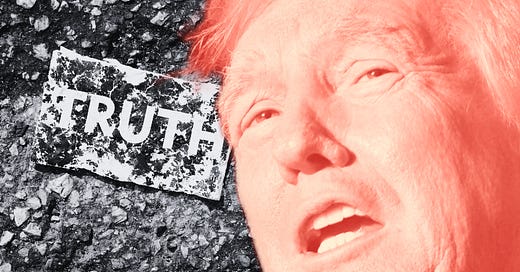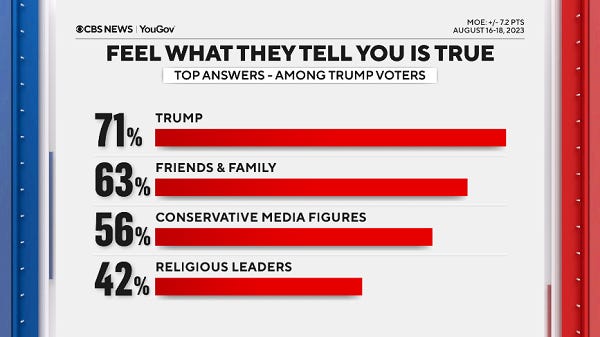
Lord of the Duped
A recent poll of Republican voters casts Donald Trump as their arbiter of truth.
A few years back, when Donald Trump was still president, I’d occasionally get into some private (and sometimes public) social-media squabbles with a regular Fox News guest, who a lot of readers here are probably familiar with. We’d become somewhat of online friends, I believe during the Obama era, but we disagreed on some things.
This fellow, who’s unarguably a patriot, took exception to assertions in my writing that much of the modern Republican base blindly bought into whatever Trump told them, no matter how blatantly and provably dishonest it was. I further argued that the same was largely true on issues of policy and ideology, and that countless Republican voters abandoned all kinds of previously held positions — including firmly-held ones — entirely to accommodate and defend Trump.
My buddy adamantly rejected the notion, claiming that Trump loyalists, of whom he sympathized, were under no illusion of who Trump was: an unprincipled, immoral buffoon who lied incessantly. Yet, they revered him for the damage he was causing to the left and corrupt institutions (the latter of which my friend never really defined). The base wasn’t mindlessly buying into whatever Trump told them, he insisted. Instead, they viewed Trump as a vehicle (albeit a banged up one), and their relationship with the president was purely transactional. Once Trump was no longer in office (and therefore no longer useful to them), the relationship would be over.
Yeah, I didn’t buy it.
It’s not that I doubted that such people existed, or that I didn’t understand where my friend was coming from. The kind of individuals he was describing were pretty easy to find in the very early days of Trump’s presidency. But the heart and soul of the Republican base had long since been absorbed into the personality-cult. Millions of former skeptics had been turned into loyal, unquestioning subjects who reflexively rationalized, defended, and normalized everything Trump did. Sure, there have remained some clear-eyed transactionalists, but they make up a relatively small minority of the party — granted, not as small as the conservatives who’ve maintained their principles over the allure of tribalism, but small enough not to carry any real influence or representation when it comes to party narratives, and of course the party’s primaries.
That guy I used to spar with no longer argues the position he defended so passionately back then, and he hasn’t in a while.
Okay, it’s possible he does it privately with others, but it’s been absent from his social media and television appearances. And frankly, he doesn’t even talk to me anymore — I suspect, in part, because of how touchy the subject is for him.
After the Big Lie, the violence of January 6, the base’s almost wholesale adoption of alternate-realities of what happened that day, the purge of Republican dissenters from public office, and a majority of Republican voters still unable to accept the reality that Trump lost to Joe Biden (while chomping at the bit to re-nominate him), it’s nearly impossible for anyone with even a hint of objectivity to deny the state of mass-servility and delusion the Republican base has largely deteriorated into.
The “binary choice” defense is no longer applicable. The “transactional relationship” argument has been tossed out the window. Deference to the Constitution and the rule of law? They’ve fallen by the wayside as well, replaced with slavish devotion to a guy who rejects both.
And unfortunately, the situation appears to have gotten even worse than I’d realized.
A recent CBS News/YouGov poll has grabbed a lot of attention, and not just because it shows Trump expanding his already enormous lead over his primary competitors:
The bigger story for many people, including me, is this right here:
Yes, you read that right. When Trump voters were asked who they believe tells them the truth, Trump himself — a guy who’s basically never met a microphone or social-media prompt he hasn’t lied through — came in at number one. His voters believe he’s more honest than the conservative media, heads of their own church, and even their own friends and family members.
And just in case you didn’t find that discovery sufficiently depressing, get a load of this:
You can’t make this stuff up, folks.
Years back, supporters who recognized but shrugged off Trump’s chronic dishonesty argued that his lies weren’t serious or consequential enough to get bent out of shape over. No one’s making that argument anymore — well, at least no one who should be taken at all seriously.
An insurrection occurred at the U.S. Capitol because of Trump’s lies; it denied our country of its peaceful transfer of power. A number of people who participated in that day’s violence are serving hard time in prison, and one even lost her life, because of those lies. Police officers defending the Capitol were severely beaten because of those lies, with some forced to retire due to the injuries they incurred, and others tragically making the decision to take their own lives. Harassment and countless death threats have been issued to public servants because of those lies. Political and professional careers have been ended, and people’s personal safety jeopardized, because of those lies. And it’s those lies that are at the root of several of the criminal charges Trump and his allies currently face.
Yet, as far as a strong majority of Republican voters are concerned, the former president is their most trusted source of honest information. Again, you can’t make this up.
There’s also that matter about Republican voters reflexively switching their political positions to align with Trump’s. There have been countless examples of this over the last seven years, but a recent New Yorker piece detailing Ron DeSantis’ struggles to gain traction in the GOP primary illustrated the phenomenon in pretty blunt terms (emphasis from me):
Even before its official launch, the [DeSantis] campaign and its allies were conducting polls and focus groups to test various anti-Trump messages. Across several months, the source familiar with the campaign said that it consistently struggled to find a message critical of Trump that resonated with rank-and-file Republican voters. Even attaching Trump’s name to an otherwise effective message had a tendency to invert the results, this source said. If a moderator said that the COVID lockdowns destroyed small businesses and facilitated the largest upward wealth transfer in modern American history, seventy per cent of the Republicans surveyed would agree. But, if the moderator said that Trump’s COVID lockdowns destroyed small businesses and facilitated the largest upward wealth transfer in modern American history, the source said, seventy per cent would disagree.
Think about that for a second. Policies considered resoundingly bad by Republican voters are suddenly just fine and dandy once you put Donald Trump’s name in front of them.
The big question in all of this is how any of Trump’s primary opponents can even hope to compete in this brutal environment. The polls so far have suggested that they can’t, and frankly, it’s hard for me to feel sorry for most of them. I’m talking about those who abandoned important stances, affirmed or at least flirted with Trump’s lies, and refused to support the handful of Republican lawmakers who went out on a political limb to seek accountability for those lies. It was done to appease Trump loyalists, and now it’s Trump’s challengers who are struggling to navigate the mess they allowed.
But I do feel sorry for this country. We are in desperate need of strong parties and strong, principled, competent leadership. And as has been the case for the last several years and election cycles, the strong odds are that we’ll get neither anytime soon.















I'm still clinging to recent history regarding Iowa where the winner hasn't gone on to win the nomination. Desperate times.
Fascinating.